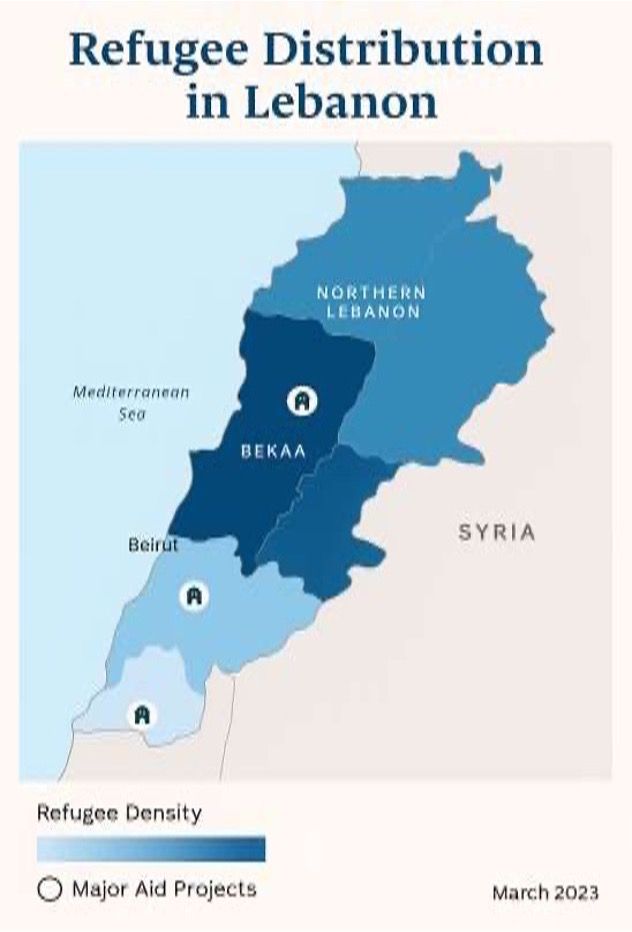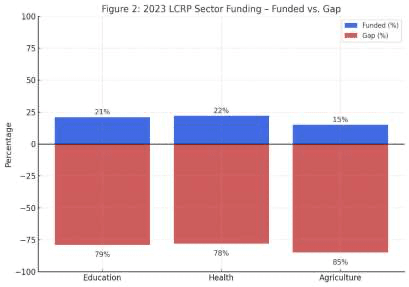Article
PoliticsSyrian Refugees in Lebanon: Reforming Policy, Restoring Dignity, and Rebuilding Together
Published on May 06, 2025

By: Ziad Hariri
Share This
Font Size
Executive Summary
Lebanon hosts approximately 1.5 million Syrian refugees-nearly 25% of its pre-crisis populationmaking it the highest per capita refugee-hosting country in the world (UNHCR, 2024). This comes amid Lebanon’s own collapse: public debt above 170% of GDP, infrastructure failures, and poverty tripling to 44% by 2022 (World Bank, 2023). Nine in ten Syrian refugees live in extreme poverty, while 70% of Lebanese in the North and Bekaa live below the poverty line (UNHCR, 2023).
This paper critiques exclusionary labor and shelter policies, highlights community-based solutions, and outlines practical reforms. Key recommendations-paired with actionable strategies-include expanding legal work opportunities, establishing a multi-year trust fund, improving shared infrastructure, and enabling voluntary refugee return planning. International support must shift from reactive to strategic, linking aid to policy reforms and dignity for both refugees and Lebanese communities.

Background and Context
Refugee Influx and Settlement Patterns
Since 2011, over 1.5 million Syrians and roughly 45,000 other refugees have sought safety in Lebanon (UNHCR, 2024). Lacking formal camps, 83% live in urban or semi-urban settingsespecially in the Bekaa Valley and northern governorates-where they face inflated rents, poor infrastructure, and increasing hostility.
Economic and Governance Breakdown
Lebanon's financial collapse has left public institutions paralyzed. The Lebanese Lira has lost over 95% of its value, and electricity, water, and healthcare services have degraded significantly. Public debt exceeded 170% of GDP in 2023, while local governments operate with virtually no resources.
A 2019 UNDP report found that 70% of municipalities already lacked essential infrastructure before the refugee crisis began. With no significant investment since, refugee and host communities now share collapsing systems.
Policy Failures
Labor Market Exclusion
Lebanese law allows Syrian refugees to work only in agriculture, construction, and cleaning. Decree 17/2018 raised permit fees and tightened sponsor requirements, forcing over 90% of refugees into informal, unprotected labor (Reuters, 2024).
Actionable Reform:
- Reform Decree 17/2018 via the Parliamentary Committee on Labor and Social Affairs.
- Expand legal sectors to include caregiving, manufacturing, food services, and green economy jobs.
Implementation strategy: Introduce a national wage floor, subsidize work permits via Lebanon Crisis Response Plan (LCPR) funds, and pilot labor cooperatives to serve as collective sponsors.
Shelter Insecurity
In 2019, Law 296/2014 was used to justify demolishing 3,500 concrete shelters in Arsal, rendering thousands homeless. These demolitions disproportionately harmed women, children, and the elderly (HRW, 2020). Refugees in cities also face eviction without legal protection.
Legal Limbo
Lebanon lacks a formal refugee law. Syrians must renew "pledges of responsibility" through Lebanese sponsors—a costly and discretionary process. As of 2023, 83% of refugees lacked legal residency (UNHCR, 2023), barring them from public services and exposing them to arrest.
Actionable Reform:
- Draft a refugee legal status bill, building on existing recommendations by the Lebanese Center for Policy Studies (LCPS) to legally define refugee rights, decouple residency from sponsorship, and establish an independent commission to coordinate refugee policy in line with international obligations.
- Implementation strategy: Engage the Human Rights and Justice Parliamentary Committees; align new laws with UNHCR’s protection framework and the 2003 MOU.
Funding Shortfalls and Programmatic Gaps
LCRP 2023 Funding Snapshot
The 2023 Lebanon Crisis Response Plan (LCRP) requested $3.59 billion but secured only 15%.

Ongoing Programs
Despite underfunding, several initiatives continue:
- Shelter: UNHCR rehabilitated over 12,000 homes in 2023.
- Education: Double-shift schools reached 200,000 refugee children (UNICEF, 2023).
- Livelihoods: UNDP’s LHSP improves infrastructure and offers training in host municipalities.
Host Communities and Social Cohesion
Shared Struggles, Rising Tensions
Many Lebanese-especially in Akkar and the Bekaa-share the same burdens as refugees: collapsing services, food insecurity, and job competition. A 2023 World Bank survey found 94% of Lebanese believe refugees strain public resources. Political leaders often fuel xenophobic narratives, while vested interests (e.g., landlords, contractors) benefit from refugee labor informality, discouraging reform.
Grassroots Solutions
Programs like Search for Common Ground, GIZ’s Peaceful Coexistence Lebanon, and EUfunded cohesion projects have rebuilt public trust, shared services, and social capital. These efforts-though modest-should be scaled through LCRP-backed community grants.
Scenario Planning
Scenario 1: Regional Escalation
- Deploy UNHCR’s Inter-Agency Contingency Plan to expand cash assistance and mobile education.
- Preposition aid (shelter kits, food) in border towns like Akkar and Hermel.
- Engage municipalities through rapid coordination centers.
Scenario 2: Syrian Stabilization
- Coordinate “go-and-see” visits for potential returnees.
- Establish a Lebanon–Syria task force on return logistics, property rights, and documentation.
- Avoid coercive returns by ensuring that returns are voluntary, safe, and rights-based.
| Reform Area | Recommendation | Implementation Strategy |
|---|---|---|
| Labor Access | Amend Decree 17/2018 | Expand sectors; subsidize permits; wage guarantees |
| Legal Status | Draft refugee protection law | Engage Parliament; align with UNHCR framework |
| Shared Infrastructure | Prioritize inclusive schools, clinics | LCRP funding tied to mixed-use community benefit |
| Flexible Aid | Create a multi-year trust fund | Jointly managed by UN, WB, ministries; include triggers |
| Political Advocacy | Counter xenophobic narratives | Support civic campaigns; fund local media and NGOs |
Conclusion
Lebanon’s refugee crisis is neither short-term nor peripheral—it is a defining feature of the country’s present and future. Yet the current policy approach treats refugees as invisible or expendable. This not only violates their dignity but undermines Lebanon’s own recovery.
The time has come to shift from reaction to reform. By legalizing employment, investing in inclusive infrastructure, enabling voluntary return, and anchoring contingency plans in real funding, Lebanon can turn this crisis into an opportunity for co-existence and growth.
Donors must also go beyond charity and use financing as leverage: linking long-term aid to labor, legal, and social reforms. With principled leadership and community resilience already visible on the ground, the path forward is within reach—if Lebanon and its partners choose it.
References
|
Share This
Contact
If you have any query about our service please contact with us
- +961 3 727 636
- infore-co-de.com
Popular Articles
June 08, 2025
From Balance to Alignment: How the 1967 War Redefined U.S. Foreign Policy in the Middle East
By Ziad Hariri
June 09, 2025
اللامركزية الإدارية في لبنان: مسار الإصلاح، التحديات، وآفاق التطبيق
By Ziad Hariri
August 17, 2025
Lebanon’s Last Chance: Disarming Nonstate Actors in a Post-War Transition
By Ziad Hariri